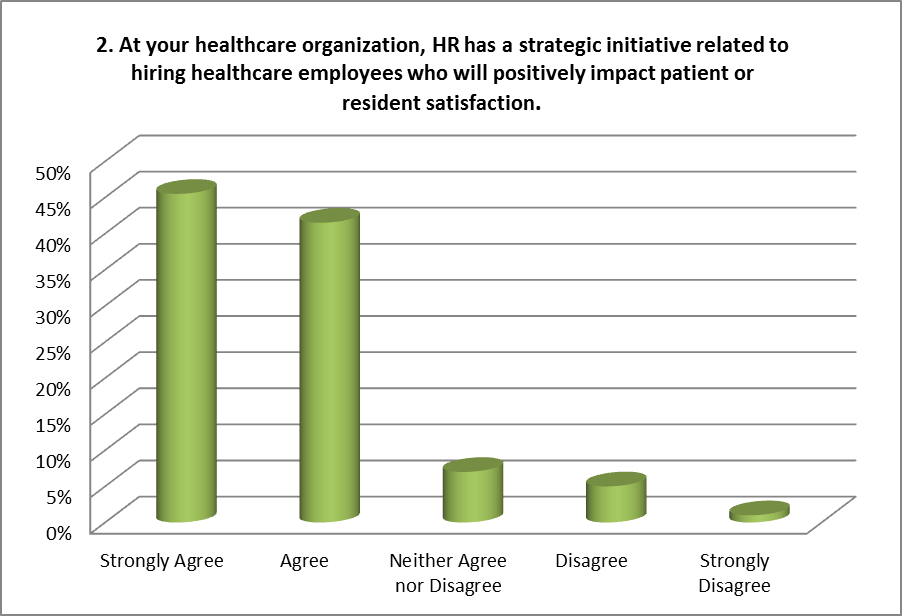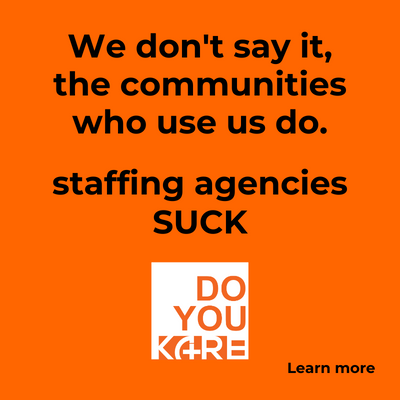It is well documented that resident satisfaction and employee satisfaction are tightly coupled. Some experts would argue the key to high resident satisfaction is high employee satisfaction. Do you have high employee satisfaction?
Last month I wrote an article that asked the question: Does HR have a Real Impact on Resident Care? That article was based on the results of a HR Influence survey done by HealthcareSource and Planetree. The survey also included this question: At your healthcare organization, HR has a strategic initiative related to hiring healthcare employees who will positively impact patient or resident satisfaction. Respondents were then asked how strongly they agreed or disagreed with this statement. Here are the results:
Good News
This is great news for our industry because there is clear evidence that employee satisfaction and resident satisfaction are tightly coupled. What this suggests is a growing appreciation in long-term care/senior living organization that at its heart, person centered care is really employee centered care.
The Old Way
It is unfortunate, perhaps even disgraceful, that for a long long time, line team members in long-term care/senior living communities were not seen as highly valued team members; almost to the point of seeing them as disposable. It was accepted that high rates of turnover were the industry norm and that nothing could be done to fix it or perhaps more accurately that it was too costly a problem fix, under the assumption that the only possible fix was higher wages.
A Better Way
While it takes great professional staff to operate a successful long-term care/senior living community ultimately resident satisfaction is primarily tied to the quality of the relationships between line staff and residents. In a very real sense, the very best relationships contain an element of genuine friendship. This means residents know something about their caregivers, their food servers, and their house keepers and of course caregivers need to be friends with those that they are caring for and the resident’s families. How do you make this happen?
1. Get to know and like your line staff – This means getting to know them, knowing about their families, the challenges and their wins. Do little things to say you care. Provide meals, celebrate birthdays, say thanks.
2. Include caregivers in care planning and management – While line staff members may not have great medical background they have something more valuable. They know the resident better than any licensed team member because they spend the most time with the resident. They are the best early warning system a community has. They are the ones most likely to catch problematic behavior changes early. Give them a voice and they will be more diligent.
3. Ask them for feedback – Creating a culture where line staff can brainstorm with supervisors and managers about how to do a better job, even about how to make more money or save money will yield amazing results.
4. Hire Smart – Use hiring tools such as behavioral assessments to identify a candidate’s inherent behavioral competencies such as compassion, customer-focus and willingness to learn to ensure they will fit in with your organization’s culture.
Tools like this are tremendously important because no matter how great your culture and your systems, if you do not hire candidates who have the right personality and attributes you could end up undermining that culture you have worked so hard to cultivate. Interested in learning how performance goals relate to resident satisfaction and how performance management software helps improve the resident experience? Download this free e-booklet: The Three Step Process for Successful Employee Goal Management to learn more.
What are you doing to ensure excellence in your team members?










I work in IL, AL and MC. If it weren’t for our line staff…..home health, dining and housekeeping, our buildings would not operate. I’m always telling people how valuable they are. And telling them as well. I am the marketing director, and I always make it a point to say thanks (and really mean it!) and tell people touring just how much they mean to our communities. I couldn’t do their jobs….hot, tiring, physical, and it just makes me appreciate them even more.
I agree. Unfortunately direct care workers are over worked under appreciated and often underpaid. Expressing gratitude for their tireless efforts must initiated from the top down and become a practice ingrained in the culture of the organization in order for it to truly be effective. Direct care workers need to hear consistent praise and appreciation from the ED, DON and especially the RN who is usually responsible for most of the care planning. Not only will this help reduce turnover but also help improve the resident-care partner relationship.